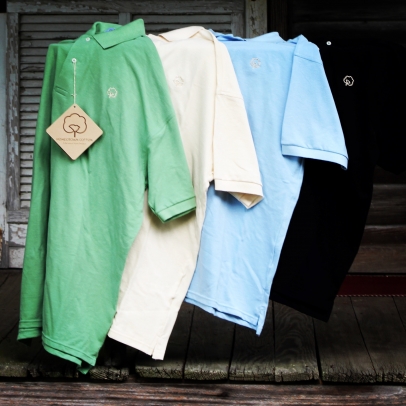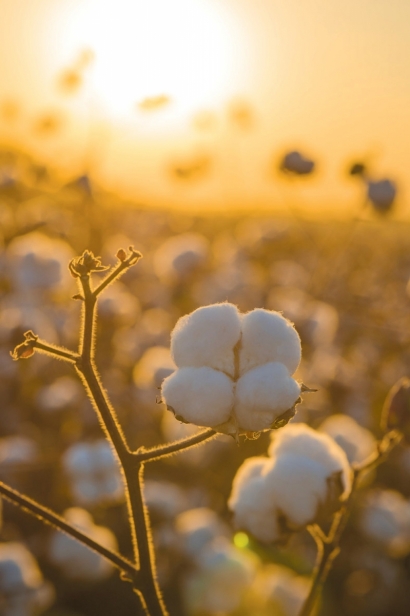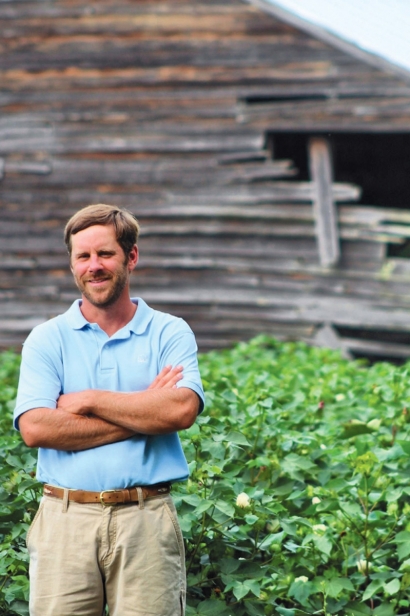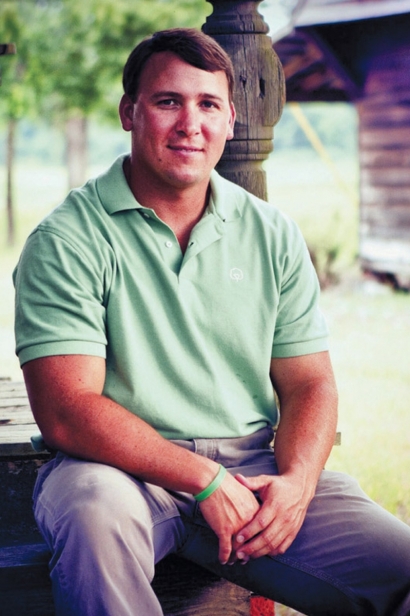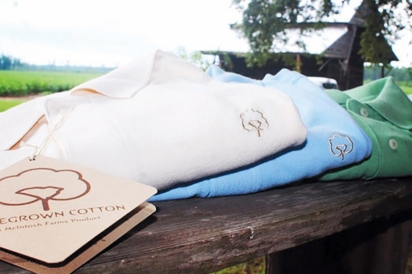Homegrown Cotton
Eighth-gen Kingstree farmer is redefining “work shirt,” from the ground up.
There’s not much shaking in Kingstree, a drowsy crossroads/ railroad town about halfway between Florence and Charleston with a population of 3,200, give or take a few. There’s a Huddle House and Pizza Hut, an Amtrak station that’s seen better days, the still-stately Robert Mills-designed historic courthouse (Kingstree is the Williamsburg County seat) and the gentle flow of the Black River—plus the less-gentle flow of trucks hurtling down Highway 52. Other than that, there’s just long, flat stretches of farmland.
But don’t equate Kingstree’s serenity with a lack of cool things happening there, for this agricultural hub is also the home of farmer-turned-entrepreneur At McIntosh of McIntosh Farms. The “At” is short for Atwood, but actually, the preposition version of his name might be more fitting. “At” as in that which indicates place, from the Old English meaning “at, near, by, toward”—because make no mistake, At McIntosh is fully of this place. This land defines him, grounds him, inspires him, feeds him, as it has for his family for more than eight generations. And this inherited love of farming Kingstree’s cotton fields has pushed McIntosh toward finding new ways of using what he grows.
“I was in a meeting one day, and looked around at the folks there, and realized that no one in that room was wearing anything that they could say for sure was made from South Carolina cotton. This community is dependent on our crops’ future, but we have few choices in terms of using and enjoying the final product of what we grow,” he says.
That aha moment in the summer of 2014 was a game-changer for McIntosh, who envisioned one day wearing a shirt made locally in South Carolina from premium cotton grown on his farm. Today, Homegrown Cotton and its line of 100% cotton polos represents his vision spun into reality.
Though he sports a classic polo quite stylishly, McIntosh never imagined that he’d be in the fashion/textile industry. The 38-year-old holds an MBA from Francis Marion University, and once thought he’d be a big wig on Wall Street, but “that never took,” he says. He eventually gravitated back to his family farm, and his community. After all, a long line of McIntoshes have cultivated this land since McIntosh’s distant ancestor, now laid to rest in a nearby cemetery, ended up here as a 16-year-old Revolutionary War patriot, more than two and a half centuries ago.
“When something’s been going on for so long, you hate to be the one to stop it,” says McIntosh, who picked his fair share of tobacco as a young boy. “It’s my destiny, I guess. The farm is like this anchor that pulls you back.”
Anchor or not, life is never stagnant on a farm—things shift and evolve, which means farmers have to be both agile and resilient in light of unreliable weather, volatile economic or political climates or all the above. During the Civil War, this region was cotton country (and indigo before that). In the years after Reconstruction, tobacco became the money crop, with Kingstree markets selling 1.75 million pounds of tobacco in 1909. By 1918, they were cashing in some 7.5 million pounds, making it the largest tobacco producer in the state. This wave continued, and McIntosh Farms, like most Kingstree area growers, remained predominantly a tobacco farm for 100 or so years. That all changed a decade ago.
“From the 1890s to 10 years ago, tobacco was king in Kingstree,” says McIntosh, who grew to love the smell of tobacco curing in a warehouse. But when the government eliminated the quota buyout system in 2004 and farmers couldn’t command a high enough price for tobacco, McIntosh and his father decided to go back to growing commodity cotton, along with peanuts and corn.
“Most of our cotton was sold to large manufacturers like Hanes,” McIntosh says, “and we’d never know exactly how it ended up being used, probably mixed in with a lot of other growers’ product and turned into socks, or underwear, or a mass-produced T-shirt.”
Now, though, McIntosh has threaded together a supply-and-production chain for Homegrown Cotton shirts that allows him to follow the cotton blossom from field to harvest to gin, to a small-scale spinning mill that transforms the cotton into cloth, to sewers and dyers and then eventually to being worn on his own hardworking back, near those very fields where he planted the initial cotton seeds.
“I knew that production would require a lot of steps,” says McIntosh, who put his MBA skills to work drafting feasibility studies and a business plan, but the learning curve still surprised him.
“I didn’t know how hard it would be to line everything up so the timing would flow together,” he says.
One of the first obstacles was finding a spinning mill that would agree to keep his cotton separate, but he eventually discovered a small mill in the once-thriving textile region of North Carolina’s Piedmont (the only part of his production chain that ventures beyond South Carolina) that could spin a small batch and thus maintain the integrity of his cotton.
“From there it was sort of backtracking—I found someone who could knit the lint into yarn, and someone who could sew the shirt, and he then led me to a guy who could do the dying…it was a slew of local, word-of-mouth connections,” says McIntosh, who has also had to find his button suppliers, someone to make his logo and hangtags, embroider his logo and create a website and social media presence to help promote his product—details this farmer never thought about before, but discovered he enjoys.
“Every step along the way is important, and building the relationships with these specialty operators has been one of the best parts,” he adds. And beneficial for those he’s partnering with as well, as many in the ailing textile industry have been as imperiled as farmers.
“These small outfits have really struggled to survive, and have had to be creative finding a niche too,” he says.
Now in its third year, Homegrown Cotton includes a line of 11 high-quality men’s polo shirts, in hues that read like an ode to the Palmetto state: Indigo (dyed from indigo grown in Williamsburg County), White Gold, Carolina Garnet, Moultrie Blue, Sea Green, Atlantic Coral, Black River, Lafayette Lilac and Country Gentlemen Orange. McIntosh is proud that 100% of production is done in the Carolinas, and all but the spinning is done in South Carolina. The shirts are sewn and finished just 40 miles from where McIntosh planted the initial cotton seeds, making the carbon footprint as low as possible, and the materials—from the premium raw cotton to the eco-friendly dyes—are all natural.
You can find Homegrown Cotton shirts at a handful of small, local retailers across South Carolina, from Williamsburg Feed & Tack in Kingstree to the South Carolina Cotton Museum Shop in Bishopville, to Craig Reagin Clothiers in Lexington and the Preservation Society Gift Shop in Charleston. However, most customers are (perhaps ironically) discovering Homegrown Cotton online, says McIntosh.
“Our primary customer is concerned about where and how their clothes are made. They like that it can be traced back locally, and are willing to pay a slightly higher price for a product that supports the local economy,” he says.
There’s no sweatshop labor involved, just McIntosh’s mother who helps out with the packaging, his father and brother who help during cotton harvest season and a team of folks in small towns across the Carolinas, hanging on by more than a thread in spite of being part of a business and trade threatened by global outsourcing and cheap mass production.
The most rewarding aspect for a farmer turned reluctant fashionista?
“I can wear one of these shirts anywhere in the country knowing that I grew this,” says McIntosh. “It’s a totally different feeling, a good, comfortable one.”


